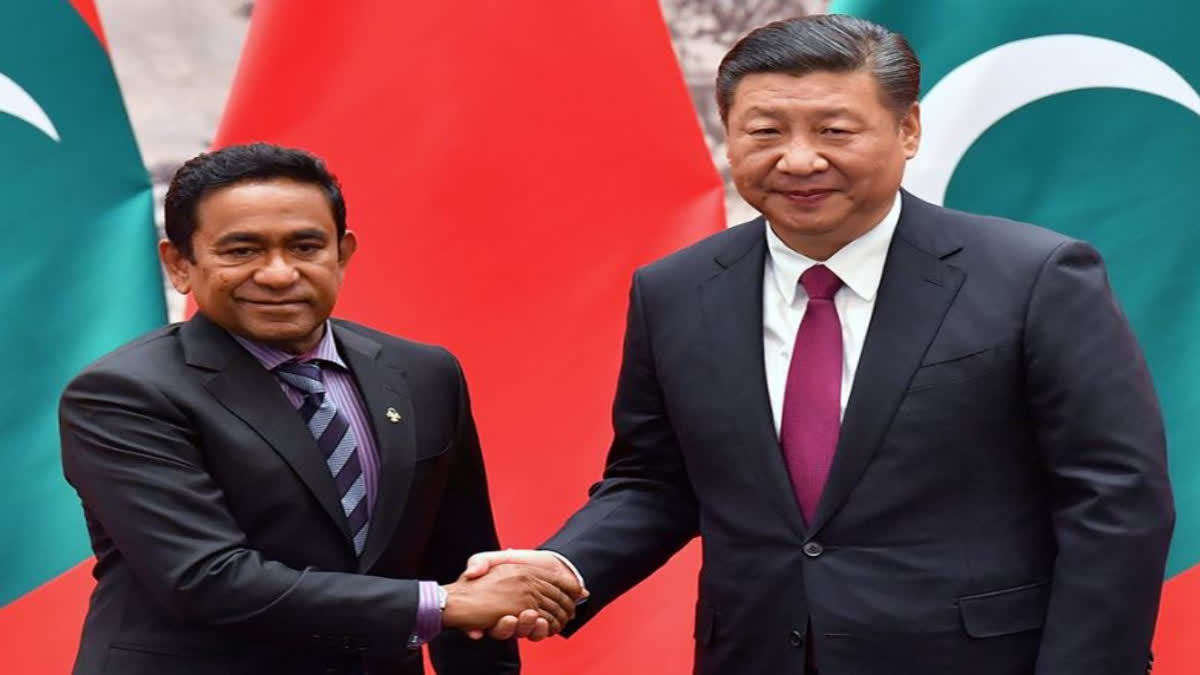New Delhi: Ex-Maldives President Abdulla Yameen, known for his pro-China stance, may be out of the race from next month’s presidential election in the Indian Ocean archipelago nation, bringing a sigh of relief for India but its worries are far from over.
The Maldives Supreme Court had last week barred Yameen of the Progressive Party of Maldives (PPM) from contesting the September 9 presidential election. The former President is currently serving an 11-year prison term in connection with a money-laundering case.
When the presidential election was first announced, observers believed that the main contest would be between incumbent President Ibrahim Solih of the Maldivian Democratic Party (MDP), who is seen as pro-India, and Yameen, who had antagonised India with his pro-China policies provided the latter is released from jail. Yameen was earlier nominated as the joint candidate by the PPM and People’s National Congress (PNC).
Though Yameen has been barred from contesting the election, he has not given up the fight yet from behind bars. The PPM-PNC alliance has nominated Mohamed Muizzu of the PNC as the joint candidate. Basically, Muizzu, who is currently serving as the Mayor of Maldivian capital Male, will be contesting the election as the proxy candidate for Yameen. This is what will keep New Delhi on its toes.
As part of New Delhi’s Neighborhood First Policy, the Maldives is strategically significant to India because of its location in the Indian Ocean. India and Maldives share ethnic, linguistic, cultural, religious and commercial links steeped in antiquity and enjoy close, cordial and multi-dimensional relations. However, regime instability in the Maldives since 2008 has posed significant challenges to the India-Maldives relationship, particularly in the political and strategic spheres.
Ties between India and the Maldives deteriorated significantly when Yameen served as the President between 2013 and 2018. It was only after Solih came to power in 2018 that ties between New Delhi and Male improved.
Although India continues to be an important partner of the Maldives, New Delhi cannot afford to be complacent over its position and must remain attentive to the developments in the Maldives. India must play a key role within the Indo-Pacific security space to ensure regional security in South Asia and surrounding maritime boundaries. China’s strategic footprint in India’s neighbourhood has increased. The Maldives has emerged as an important 'pearl' in China’s “String of Pearls” construct in South Asia.
Last month, when Maldives Foreign Minister Abdulla Shahid visited India, observers believed that it was more to do with the upcoming presidential election in his country than developmental assistance-related issues.
According to Anand Kumar, Associate Fellow at the Manohar Parrikar Institute of Defence Studies and Analyses (MP-IDSA) and author of a book on the Maldives, President Solih continues to be a forerunner in this year’s election.
“Solih is the number one candidate,” Kumar told ETV Bharat. “If he comes back to power, he will further solidify ties with India.” With Yameen out of the race, so who will pose the main challenge to Solih?
“Yameen’s proxy candidate will be the main challenger,” Kumar said. “The first round will be mainly between Solih and Yasmeen’s candidate. But can a proxy candidate pose a challenge to an incumbent president? Kumar said it is possible and referred to Solih himself. In the 2018 presidential election, Mohamed Nasheed of the MDP, who had served as the President from 2008 to 2012, was barred from contesting by the Maldives Election Commission. Nasheed had then put up Solih as his proxy who had then gone on to defeat incumbent President Yameen.
Earlier this year, Solih had defeated Nasheed, who is currently serving as the Speaker of the Majlis, in the MDP presidential primaries. Since then, Nasheed and Solih, who are boyhood friends, fell out politically. Nasheed then went on to form a new political party called The Democrats. He has now put up Ilyas Layeeb, an accomplished Maldivian politician, as The Democrats’ candidate against Solih.
According to the Maldives election process, if a single candidate does not get more than 50 per cent of the votes in the first round, then the two candidates with the highest number of votes have to go for a second-round face-off.
“Solih may not get 50 per cent of the votes in the first round,” Kumar explained. “In that case, a new picture will emerge and new alliances will be built.”
Solih now faces seven candidates in the presidential election: Muizzi of the PPM-PNC alliance, Layeeb of The Democrats, Mohamed Nazim of the Maldives National Party (MNP), Ahmed Faris Maumoon of the Maldives Reform Movement (MRM), Qasim Ibrahim of the Jumhooree Party (JP), and two independent candidates, Umar Naseer and Hassan Zameel.



